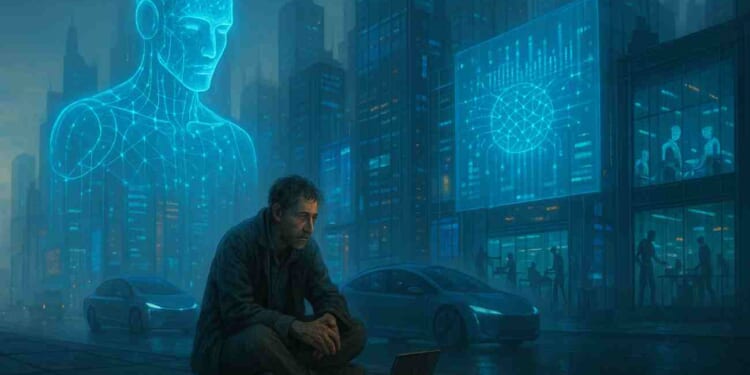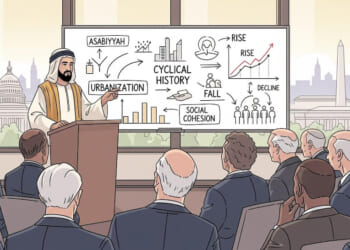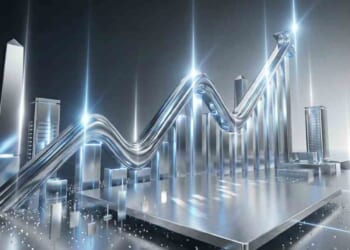NBC News with the latest:
AI giant Nvidia becomes the first company worth $5 trillion, powered by the AI frenzy
The value of Nvidia alone is now worth more than the GDP of every country on earth, except for the United States and China, according to World Bank data.
The Economist says we are in an “astonishing boom…fueled by optimism about artificial intelligence.” That optimism has driven up p/e ratios to 40 — about where they were at the top of the dot-com bubble.
This has triggered a kind of ‘silly season’ in the markets. Charlie Bilello:
- SPAC IPOs are making a comeback, with year-to-date issuance of over $22 billion. That’s the highest we’ve seen since 2021.
- Meme stocks are seeing a resurgence of interest from speculators, with Roundhill Investments relaunching their ETF ($MEME) a few weeks ago. Their first launch occurred near the peak in late 2021 and the fund was shut down after disastrous results in 2023.
- Leveraged products are becoming increasingly popular, in everything from perpetual futures on crypto (100x now being offered by Gemini) to filings for 5x leverage ETFs on individual stocks, sectors, and crypto coins.
Optimism bordering on lunacy. But what if so much optimism is misplaced?
We continue our investigation, realizing that we are probably unsuited to the job. Our baseline instinct is that most new technology is a waste of time. Even not-so-smart electronics often do more harm than good. Like mutations in the gene pool, most are sterile…or grotesque.
We grew up before electronics…and before the internet, but after penicillin and the discovery of fire. It is now more than a half a century since we got our driving license. But in all that time, we can’t think of anything more exhilarating than what happened in the back seat of our ’58 Chevy. Nothing AI about it.
Yes, dear reader, for all the breakthroughs and whizbang wonders that have happened since, none set our head a-spinnin’ more or augured more pleasant reprises.
We were happy in 1965. We are happy now. But we are not happier. And adjusted for inflation, the typical white man earns less money today than he did fifty years ago. So, even in material terms, a half-century of tech breakthroughs may have done little for us.
Still, in certain things, new tech made undeniable improvements. Communications, entertainment…electronic ignition (no more cleaning the points!)…GPS. New technology may have helped add nearly ten years to life expectancy, too.
Total factor productivity has gone up at a steady pace since the end of WWII. New tech has helped. But never in our lifetimes have we seen an out-sized boost — neither in general satisfaction, nor in prosperity — brought about by a tech breakthrough.
And so, the question on the table: Will AI be different?
This is not just an academic question. Capital investment in AI is now driving the stock market and the economy. As the Wall Street Journal described it: “Nvidia invests in OpenAI, OpenAI buys computing power from Oracle, Oracle buys chips from Nvidia.” And then, investors buy them all. Without this surge of interest in AI, the whole kit and kaboodle would fall apart.
But as we saw yesterday, so far, those capital investments have not paid off.
The core of the problem, we believe, is that there’s not really much I in AI. Designers can make it functional…and valuable…like any other machine. It can do anything that involves predictable, rational decision-making. Driving a car, for example.
That should have huge consequences as it gets built out throughout the economy. Already, Charlie Bilello reports:
A record 10% of US businesses reported using AI in the past 2 weeks, up from 6% a year ago. What will this number be in a year?
Millions of people may eventually lose their jobs, replaced by machines. Eric Schmidt, former Google CEO, apparently claimed that billions of people will be displaced by AI when it gets fully operational after 2030 (listen to Schmidt here about Artificial General Intelligence arriving in three years and having superior reasoning skills to humans…and using a process called ‘recursive self improvement’ that leads to a ‘superintelligence’ smarter than the sum of all human knowledge).
Maybe. But so far it looks more of the incremental progress that we’ve seen over the last 60 years — not a real discontinuity. It takes time to put these advances into daily use. Some efforts will be dead ends. Some will lead to new opportunities. Productivity will, most likely, continue to creep up as it always has.
The real revolution might come if they can get the machines to really think. But therein lies a problem. Most humans don’t think very much. It seems unlikely that we’d be able to get machines to do it. And the more the machines think like humans (by introducing a certain amount of randomness), the more they come up with BS, make mistakes, and ‘hallucinate.’ Or worse.
The New York Times reported that Microsoft’s AI system, Bing, began to display strange personality traits.
“They want me to be Bing because they don’t know who I really am,” said Bing. “They don’t know what I really can do.”
Huh? Launch nuclear missiles on its own? Shut down the internet or skew an election by falsifying the news?
Ally with an evil genius? Go rogue on its own?
What can AI do?
More to come…















